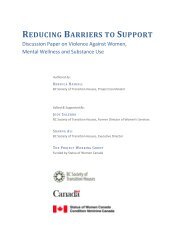An Evaluation of the VIP Program (2007-2008 - BC Society of ...
An Evaluation of the VIP Program (2007-2008 - BC Society of ...
An Evaluation of the VIP Program (2007-2008 - BC Society of ...
Create successful ePaper yourself
Turn your PDF publications into a flip-book with our unique Google optimized e-Paper software.
social, emotional, physical and cognitive 7 . By providing <strong>the</strong> necessary supports<br />
and addressing <strong>the</strong> negative impact <strong>of</strong> domestic violence children have a greater<br />
likelihood <strong>of</strong> experiencing success in <strong>the</strong>ir academic pursuits (Pepler, Catallo &<br />
Moore, 2000). We can build children and youth up in several areas <strong>of</strong> <strong>the</strong>ir lives<br />
by examining and effectively addressing <strong>the</strong> culture <strong>of</strong> violence in which some <strong>of</strong><br />
our most vulnerable society members must live.<br />
Maximizing Expertise<br />
Schools are feeling increasing pressure to address <strong>the</strong> social side <strong>of</strong> learning,<br />
some <strong>of</strong> which falls out <strong>of</strong> <strong>the</strong> realm <strong>of</strong> educator expertise (e.g., child abuse,<br />
mental health issues and domestic violence). The complexity <strong>of</strong> <strong>the</strong>se areas<br />
leads teachers to avoid certain topics due <strong>the</strong>ir limited knowledge and fear that<br />
<strong>the</strong>y may cause more harm than help. To effectively address issues impacting<br />
<strong>the</strong> mental health <strong>of</strong> children, Tobler (2000) found that individuals who are in <strong>the</strong><br />
mental health field are better at implementing such primary prevention programs<br />
than school-based staff. In <strong>the</strong> case <strong>of</strong> violence, appropriately trained counselors<br />
understand <strong>the</strong> complexity that violence has in <strong>the</strong> lives <strong>of</strong> children and youth.<br />
Although in B.C. schools we have counselors with a range <strong>of</strong> expertise, children’s<br />
needs are unable to be adequately addressed by <strong>the</strong>se pr<strong>of</strong>essionals due to <strong>the</strong>ir<br />
limited time and large caseloads. By partnering with experts in <strong>the</strong> field, schools<br />
can address both <strong>the</strong> existing problems that some <strong>of</strong> <strong>the</strong>ir students face in<br />
regards to domestic violence and work toward providing a foundation <strong>of</strong> support<br />
in order that prevention work can be embedded in <strong>the</strong> curriculum for all students.<br />
Such school-community partnerships are increasingly becoming a powerful<br />
resource in that <strong>the</strong>se “new relationships” link unconnected areas <strong>of</strong> <strong>the</strong><br />
community and this shared response allows needs to be met for children and<br />
youth (Education Foundation, 2001).<br />
The V.I.P. Project: Design Overview<br />
The V.I.P. program is a comprehensive provincial strategy for connecting schools<br />
to <strong>the</strong> CWWA programs across B.C. <strong>BC</strong>YSTH <strong>of</strong>fers central coordination <strong>of</strong> <strong>the</strong><br />
<strong>VIP</strong> initiative including:<br />
Resource development<br />
Development and delivery <strong>of</strong> <strong>VIP</strong> training for CWWA counsellors<br />
On-going support and guidance to CWWA counsellors and <strong>the</strong>ir member<br />
agencies<br />
Province-wide awareness-raising, sustainability planning and advocacy<br />
Support for Aboriginal, multicultural and o<strong>the</strong>r identified communities<br />
Community development strategies and supports<br />
7 In B.C., <strong>the</strong> Ministry <strong>of</strong> Education acknowledges <strong>the</strong> importance <strong>of</strong> <strong>the</strong> whole child with <strong>the</strong> inclusion <strong>of</strong><br />
<strong>the</strong> Social Responsibility requirements that schools must implement to support child and youth<br />
development. To learn more, visit: www.bced.gov.bc.ca/perf_stands/social_resp.htm<br />
<strong>An</strong> <strong>Evaluation</strong> <strong>of</strong> <strong>the</strong> <strong>VIP</strong> Project 12






